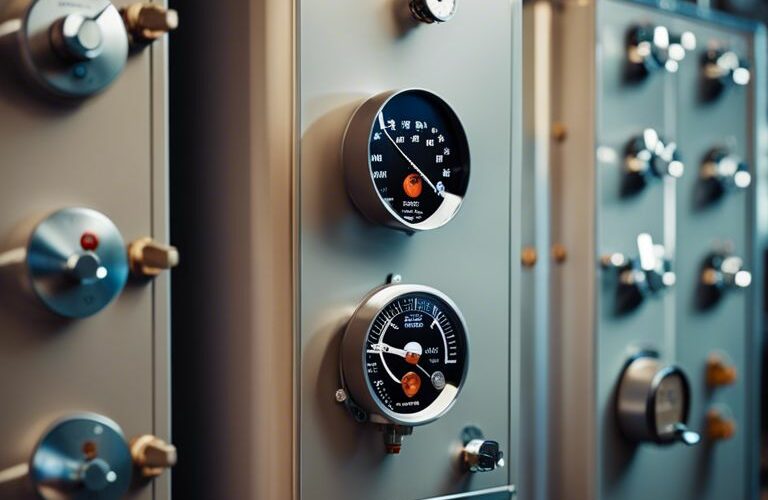Boilers are indispensable in providing warmth to our homes, but their importance is often overlooked until they malfunction. Regular maintenance is crucial to maximize efficiency and prevent potential hazards such as carbon monoxide leaks. In this blog post, we will discuss simple yet effective steps to maintain and optimize your gas boiler’s efficiency, ensuring the safety and comfort of your household.
Table of Contents
Understanding Your Gas Boiler
For many homeowners, the gas boiler is an essential component of their heating system. Understanding how your gas boiler functions is crucial for maintaining its efficiency and ensuring its optimal performance. In this chapter, we will delve into the inner workings of gas boilers, as well as the common types and their efficiency profiles.
How Gas Boilers Work
Gas boilers work by heating water to provide central heating and hot water. The process begins with the burning of natural gas or propane to create heat, which is then transferred to the water within the system. This hot water is circulated through pipes and radiators to warm up the space or provide hot water for domestic use. The boiler continues to maintain the water at a set temperature, ensuring a constant supply of warmth and hot water.
Common Types and Their Efficiency Profiles
Gas boilers come in several common types, each with its own efficiency profile and characteristics:
- Combi boiler: Provides heating and hot water on demand, high efficiency
- System boiler: Requires a cylinder for hot water storage, good efficiency
- Regular boiler: Requires a separate hot water cylinder and cold water tank, moderate efficiency
Recognizing the efficiency profile of each type is crucial for determining the most suitable option for your home heating needs. Importantly, understanding the efficiency ratings and fuel usage of different types of gas boilers can help you make an informed decision when installing or replacing a boiler.
Common Types and Their Efficiency Profiles
Plus, It is important to consider the size of your property and your hot water usage when selecting a gas boiler. Ensuring the right fit can optimize energy usage and ultimately lead to cost savings in the long run. Regular maintenance and yearly servicing can also contribute to maintaining the efficiency and prolonging the lifespan of your gas boiler.
Regular Maintenance Practices
The key to keeping your gas boiler running efficiently and effectively is regular maintenance. By incorporating a few simple practices into your routine, you can ensure that your boiler operates at its best, while minimizing potential issues and maximizing its lifespan.
Annual Inspection and Servicing
Inspection and servicing of your gas boiler should be conducted at least once a year by a qualified professional. During this process, the technician will thoroughly inspect the unit, checking for any signs of wear and tear, as well as making sure that all components are functioning properly. Additionally, they will clean and adjust the boiler as needed, ensuring that it continues to operate at peak efficiency.
The annual inspection and servicing of your gas boiler is critical for identifying any potential issues before they escalate, and for maintaining its efficiency and safety. Ignoring this important maintenance task could lead to decreased efficiency, increased energy consumption, and even safety hazards within your home.
Cleaning Key Components
Servicing the key components of your gas boiler, such as the burners, heat exchanger, and flue passages, is essential for ensuring optimal performance. Over time, these components can become clogged with debris, affecting the boiler’s efficiency and potentially causing serious damage. Regular cleaning of these key components will help to prevent such issues and keep your boiler running smoothly.
This routine maintenance is crucial for preventing potential blockages, inefficiencies, and even dangerous malfunctions in your gas boiler. By staying on top of this task, you can ensure that your boiler continues to operate safely and efficiently.
Checking for Leaks and Corrosion
Practices such as checking for leaks and corrosion on your gas boiler and its associated pipework should be incorporated into your regular maintenance routine. Leaks or corrosion can lead to significant safety hazards, as well as decreased efficiency. Regular inspections for these issues can help to catch and address any problems before they escalate.
Leaks or corrosion within your gas boiler system can pose serious risks to your home and family, making it essential to include regular checks for these issues in your maintenance routine. By addressing any potential problems early on, you can avoid more costly and dangerous issues down the line.
Optimizing Boiler Efficiency
Your gas boiler’s efficiency can be optimized through various measures that can help you save on energy costs and reduce wear and tear on the system. By implementing these simple steps, you can ensure that your boiler operates at its peak efficiency, providing reliable heat with minimal energy consumption.
Thermostat and Control Adjustments
To maximize your boiler’s efficiency, start by making thermostat and control adjustments. By programming your thermostat to lower the temperature when you are away or asleep, you can reduce energy waste and save money on your heating bills. Additionally, consider installing a programmable thermostat that allows you to set specific heating schedules based on your daily routine. This will help your boiler operate more efficiently by providing heat only when needed.
Regularly check and calibrate your thermostat to ensure accurate temperature readings and optimal heating control. By fine-tuning your boiler’s controls, you can prevent unnecessary energy usage and improve overall efficiency.
Upgrading Insulation and Sealing
Insulation plays a crucial role in maintaining your boiler’s efficiency. By upgrading insulation in your home, especially in the attic, walls, and around pipes, you can minimize heat loss and improve the overall performance of your boiler. Additionally, sealing any air leaks in windows, doors, and ductwork can prevent cold drafts and heat escape, allowing your boiler to operate more efficiently. Proper insulation and sealing not only enhance your comfort but also contribute to significant energy savings.
With improved insulation and sealing, your boiler will experience reduced workload, decreased energy consumption, and extended lifespan, ultimately resulting in lower heating costs and improved environmental impact.
Smart Heating Solutions
Efficiency can be further enhanced through the implementation of smart heating solutions. By integrating smart thermostats, zone control systems, and weather-responsive heating controls, you can optimize your boiler’s operation and minimize energy wastage. These advanced technologies enable precise heating management based on real-time occupancy, weather conditions, and individual room requirements, ensuring maximum comfort and efficiency.
Heating efficiency can be greatly improved by utilizing smart heating solutions, leading to enhanced comfort, reduced energy consumption, and lower heating costs. By investing in these innovative technologies, you can take full control of your heating system and reap long-term benefits.
Water Treatment and Quality
Upgrading your boiler’s water treatment and quality can significantly impact efficiency and longevity. By implementing water treatment systems and ensuring proper water quality, you can prevent corrosion, scaling, and sludge buildup within the boiler, leading to improved heat transfer and reduced energy consumption. Maintaining clean and treated water in your boiler system is essential for optimal performance and reliability.
Plus, regular maintenance, water quality testing, and the use of inhibitors can effectively protect your boiler from damage, ensuring efficient operation and prolonging its lifespan.
Troubleshooting Common Issues
Noticing issues with your gas boiler’s performance can be concerning, but many common problems can be addressed with some troubleshooting. By understanding the most frequent issues and how to handle them, you can maintain and optimize your boiler’s efficiency.
Ignition Problems
Problems with the ignition of your gas boiler can lead to frustration and discomfort. If you are experiencing issues with the pilot light or electronic ignition, there are a few troubleshooting steps you can take. First, ensure that the gas supply is on and that the pilot light is lit. If the pilot light is out, follow the manufacturer’s instructions for relighting it. If you have an electronic ignition, check for any error codes on the display and consult the manual for guidance.
If the ignition problems persist, it’s essential to contact a qualified technician to inspect and repair the ignition system. Ignition issues can be dangerous, and attempting to fix them without the necessary expertise can result in further complications.
Inconsistent Heating
Troubleshooting inconsistent heating in your gas boiler requires a systematic approach to identify the underlying cause. Start by checking the thermostat settings and ensuring they are correctly configured for your desired temperature. Additionally, inspect the radiators for any air pockets or blockages that may be affecting their output. If you have a programmable thermostat, review the programming to confirm it aligns with your heating needs.
With persistent inconsistent heating, the boiler’s circulation pump, pressure levels, or water flow could be contributing factors. These issues are best addressed by a professional technician who can conduct a thorough assessment and implement the necessary repairs.
Unusual Noises
Inconsistent or unusual noises coming from your gas boiler can indicate underlying issues that require attention. If you notice clunking, banging, or whistling sounds, it’s important to investigate further. Inspect the boiler for any visible signs of loose components or excessive buildup of sediment. Additionally, consider the age of the boiler and whether it may require maintenance or parts replacement.
Heating system components such as the heat exchanger, pump, or valves could be sources of unusual noises and should be inspected by a professional to prevent further damage or inefficiency.
High Fuel Consumption
Unusual spikes in fuel consumption from your gas boiler can be a sign of inefficient operation or underlying issues. If you notice a significant increase in your energy bills without a corresponding change in heating demands, it’s important to address the potential causes. Start by checking for any visible leaks in the boiler or piping, as well as inspecting the burner for proper combustion.
High fuel consumption can result from inefficient combustion, faulty components, or poor insulation within the system. Seeking professional assistance to diagnose and resolve these issues is crucial to prevent potential safety hazards and optimize the boiler’s performance.
Conclusion
The simple steps provided in this guide can help you maintain and optimize your gas boiler’s efficiency, saving you money on energy bills and reducing your carbon footprint. By regularly cleaning and inspecting your boiler, adjusting the settings for optimal performance, and addressing any issues promptly, you can ensure that your boiler operates at its best. Remember to also schedule regular professional servicing to keep your boiler in top condition. With these proactive measures, you can enjoy a more efficient and reliable heating system for years to come.
FAQ
Q: Why is it important to maintain and optimize my gas boiler’s efficiency?
A: Maintaining and optimizing your gas boiler’s efficiency is crucial for saving energy, reducing fuel costs, and extending the lifespan of the boiler. It also ensures that your boiler operates safely and effectively, minimizing the risk of breakdowns and repairs.
Q: How often should I perform maintenance on my gas boiler?
A: It is recommended to have your gas boiler serviced at least once a year by a qualified and licensed professional. Regular maintenance helps to identify and address any issues before they become major problems, ensuring the efficiency and safety of your boiler.
Q: What are some simple steps to maintain my gas boiler’s efficiency?
A: Simple steps to maintain your gas boiler’s efficiency include regularly checking and cleaning the boiler’s components, ensuring proper insulation, and adjusting the thermostat to optimal levels. Flushing the system and venting the radiators can also help to improve efficiency.
Q: How can I optimize my gas boiler’s efficiency?
A: To optimize your gas boiler’s efficiency, consider upgrading to a high-efficiency model, installing smart heating controls, and improving the insulation in your home. It’s also important to use your boiler’s thermostat wisely and to schedule regular professional maintenance.
Q: What are the benefits of maintaining and optimizing my gas boiler’s efficiency?
A: By maintaining and optimizing your gas boiler’s efficiency, you can lower your energy bills, reduce your carbon footprint, and enjoy a more comfortable and consistent heating experience in your home. Additionally, it helps to minimize the risk of system breakdowns and costly repairs.

Our contributing author is a passionate advocate for eco-friendly living and sustainability. With a background in eco-life, they are dedicated to inspiring and empowering individuals to adopt environmentally conscious lifestyles. Through insightful articles, they share practical tips, innovative solutions, and thought-provoking perspectives to promote a greener, more sustainable world. Join them on the journey towards eco-smart living and discover how small choices can make a big impact. 🌱









